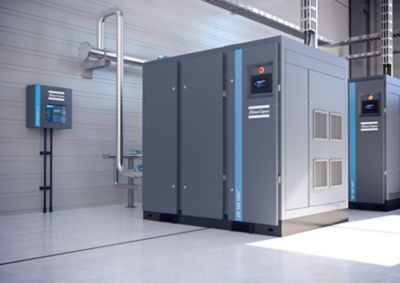Future-ready air compression: high efficiency compressors
When your business decides decides to apply cost saving solutions and switch to an energy efficient air compressor, then it has already made the most important and beneficial choice. However, in order to maximize your energy savings and minimize the total cost of ownership, there are still many things that have to be considered.
While adjustments can be made following the initial air compressor purchase, these retroactive changes are usually associated with higher costs. That means it is important to get it right the first time.
Keeping down investment costs
The total cost of ownership of a compressor consists of the cost to buy it and the cost to run it during its lifetime. Energy-efficient air compressors usually have a higher price tag but much lower operating costs, which saves money in the long run. In fact, the initial investment constitutes only a small fraction of the total cost of ownership while electricity costs make up the bulk of it.
Defining the right air compressor model
While energy consumption saving compressors are all about energy efficiency, picking the right model still matters. That means buyers first have to be aware of their compressed air demand.
That starts by asking themselves the following questions:
- How much airflow and air pressure do they need and for which applications?
- Will the compressor run constantly or intermittently?
- How important is compressed air quality?
- Does the air demand fluctuate or remain steady?
Defining the right air compressor size and technology
The answers to these questions will determine the ideal size of the air compressor, whether fixed speed compressors are the better option or a model with variable speed drive (for fluctuating air demand).
Will a piston compressor be sufficient (for intermittent use and a limited air demand) or is a a rotary screw compressor needed?
If air quality is important, then an oil-free compressor is the right choice.
If the application requires dry air, then a dryer should be integrated.
All of these choices illustrate why it is important to get the answers beforehand. For example, an air dryer could be installed retroactively, but that would be more expensive.
Keeping down operating costs
Your compressed air quality needs
Once you have chosen the high efficiency air compressor that suits your needs, the next task is to reduce operating costs even further. You have quite a few options. Keep in mind that not only does the outgoing air purity matter but also the quality of the intake air. The cleaner the air, the better it is. If, for example, the compressor is placed in an area where the intake air is polluted or dusty, then those particles will make their way into the equipment and filters are needed to keep them out of the compressed air flow. And each filter will add to the maintenance bill and result in a pressure drop, i.e. add to your energy consumption costs.
That is why it is important to place the compressor in an area where such air contaminants are kept to a minimum. Ambient temperature also matters. A 5°C increase in the air inlet temperature will reduce the compressor’s performance by 2%. And that energy efficiency loss adds up over time.
Your pressure requirements
Another way to optimize your compressor energy efficiency is to reduce the pressure in its distribution system by 1 bar (14.5 psi), which saves 7% in electric costs. If your applications and systems can run at a lower pressure, then this is a very simple measure you can take to save energy and cut your electric bill even more.
An effective way of doing this is to use a central controller for all air compressors and dryers. That system allows operators to set the ideal machine combination and reduce energy and power consumption. Such a controller can also be paired with connectivity technology that allows you to monitor your compressed air system from anywhere and optimize it as needed.
Don’t let your heat go to waste
Air compressors generate heat. Most businesses allow this heat to dissipate as quickly as possible to keep the ambient temperature down. But there is another way: Instead of letting it go to waste, installing an energy recovery system will allow you to recoup and re-use up to 90% of the energy required to run a compressor.
So, don’t just let the heat vanish into thin air. Instead, use it to heat a building, water or steam.
Allow an expert to help you pick a high efficiency compressor
Granted, this is a lot to pay attention to but, if you follow the advice above, you will quickly see your carbon footprint and your energy bills shrink at the same speed over time.
And if you need help selecting yourhigh efficiency compressor or optimizing it, simply reach out to our experts, who will be happy to assist you.

